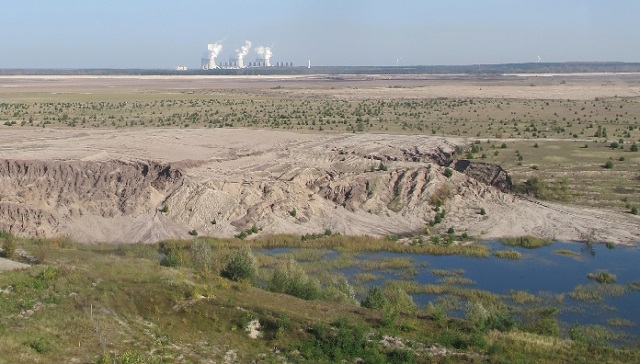
this one near Lusatia in a few decades. INDEPENDENT/RONALD MUSOKE
In Germany, determined switch from fossil fuels to clean, low-carbon energy meets skeptical critics
Kampala, Uganda | RONALD MUSOKE | On the outskirts of Cottbus, a quiet small city in Germany’s northeastern state of Brandenburg is Drehnow, a village of about 800 people.
On this warm October afternoon, one sees a quiet, relaxed and affluent—looking community. In fact, it is one of the richest small villages in Brandenburg. Its roads are narrow but paved and neat. It has well serviced guesthouses and restaurants as well as kindergartens, and a recently refurbished community fire brigade house.
It also boasts a park of dozens of giant white wind turbines that generate clean electricity for distribution across Germany and neighbouring countries.
Also not far away from the big blades of the wind turbines whizzing around several hundred metres in the sky is another large power plant – of solar. The 70.8MW LieberoserHeide Photovoltaic Park sits on a former military training ground for the Soviet troops, its 900,000 black solar panels stretching as far as the human eye can see.
In many respects Drehnow meets its billing as a representative of the future of Germany’s energy transition vision—a dream which involves phasing out most of the country’s coal and nuclear power plants to renewable energy sources. Its outlay of wind turbines are part of the 27,270 turbines that have been installed across Germany according to the German Wind Energy Association.
But to demonstrate the stark difference between the past and the future, our tour guide; Sebastian Zoep, makes us climb a tower hundreds of metres above the ground. Once on top one gets a perfect look at an expansive former coal mining operation.
This is Lusatia, a coal mining region near Drehnow. Until recently, Drehnow drew its livelihood from mining of soft coal known as ‘lignite’ from Lusatia.The sheer size of the lignite mines is overwhelming and makes it easy to see why scientists often lump smoke from coal power plants into the category of greenhouse gases damaging the environment of the world – even if you might not understand how.
Although mining was halted a few years back and what are left are deep gaping pits full of stagnant dirty water which seeps out from underground, the landscape appears desolate and the soil is quite soggy from the continued leakage of underground water. In the distance, white smoke still billows ominously out of the giant grey chimneys of other coal plants; disrupting the clear blue sky, as it makes its way into the air.
Germany’s paradox
This is the irony the German government has to deal with on a day-to-day level.Coal still contributes up to 40% of Germany’s overall electricity supply. But our guide remains optimistically in the greens corner.
“There is no future for fossil fuels,” he says, “It is just a matter of time that the world switches to renewable energy sources.”
But Dr. Anna Pegels, a senior researcher at the German Development Institute says Germany “is still engulfed in a kind of paradox.”
Despite Germany’s greening programme, she says, the European economic giant remains a major emitter of greenhouse gases.
To further complicate the situation are some fossil energy companies and associations that are protesting against the proposed closure of power plants. They cite big job losses.
Other critics say Germany is an industrialized nation with an energy-intensive economy and will one day inevitably turn around and get back to fossil fuels.
But Ernst Peter Fischer, the Deputy Director General for Globalization, Energy and Climate Policy in the Federal German Foreign Office, insists Germany’s energy transition programme is irreversible.
“Germany will switch to renewable energy,” he says.
Fischer says the country has already shown that a modern open industrialised society can grow and at the same time strongly reduce greenhouse gas emissions.
As a result, Germany saves close to €100b every year in import substitution for fossil fuels that the country no longer has to import.
Finally, other critics of Germany’s greening programme are convinced but frustrated by what they see as a “slow rate.” They say the rate at which Germany has been cutting back on greenhouse gas emissions has been too slow and pointed out that Germany’s Climate Action Plan does not include a concrete measure on how and when Germany will withdraw from coal powered electricity.
 The Independent Uganda: You get the Truth we Pay the Price
The Independent Uganda: You get the Truth we Pay the Price


